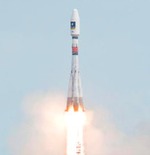Frozen hydrazine lines blamed for Soyuz Galileo launch anomaly
Posted: Fri, Oct 10, 2014, 7:57 AM ET (1157 GMT)
 An investigation into a problem that stranded two Galileo satellites in the wrong orbits in August concluded that hydrazine fuel lines in the Soyuz rocket's upper stage froze during the launch. The August 22 launch of the two Galileo satellites on a Soyuz rocket from Kourou, French Guiana, was initially declared a success, but hours later officials said the satellites had been deployed in the wrong orbit. The orbital error, investigators concluded this week, was linked to an orientation error in the Fregat upper stage caused by the failure of the stage's attitude control thrusters. Those thrusters failed because their hydrazine fuel lines had frozen by being in close contact with cold helium feed lines. Investigators said poor design, and not manufacturing error, caused the lines to be close enough to freeze the hydrazine. Vehicle engineers can correct the problem with relatively simple design changes, investigators concluded. Arianespace, which operates the Soyuz out of French Guiana, said launches of the vehicle could resume as soon as December.
An investigation into a problem that stranded two Galileo satellites in the wrong orbits in August concluded that hydrazine fuel lines in the Soyuz rocket's upper stage froze during the launch. The August 22 launch of the two Galileo satellites on a Soyuz rocket from Kourou, French Guiana, was initially declared a success, but hours later officials said the satellites had been deployed in the wrong orbit. The orbital error, investigators concluded this week, was linked to an orientation error in the Fregat upper stage caused by the failure of the stage's attitude control thrusters. Those thrusters failed because their hydrazine fuel lines had frozen by being in close contact with cold helium feed lines. Investigators said poor design, and not manufacturing error, caused the lines to be close enough to freeze the hydrazine. Vehicle engineers can correct the problem with relatively simple design changes, investigators concluded. Arianespace, which operates the Soyuz out of French Guiana, said launches of the vehicle could resume as soon as December.
 An investigation into a problem that stranded two Galileo satellites in the wrong orbits in August concluded that hydrazine fuel lines in the Soyuz rocket's upper stage froze during the launch. The August 22 launch of the two Galileo satellites on a Soyuz rocket from Kourou, French Guiana, was initially declared a success, but hours later officials said the satellites had been deployed in the wrong orbit. The orbital error, investigators concluded this week, was linked to an orientation error in the Fregat upper stage caused by the failure of the stage's attitude control thrusters. Those thrusters failed because their hydrazine fuel lines had frozen by being in close contact with cold helium feed lines. Investigators said poor design, and not manufacturing error, caused the lines to be close enough to freeze the hydrazine. Vehicle engineers can correct the problem with relatively simple design changes, investigators concluded. Arianespace, which operates the Soyuz out of French Guiana, said launches of the vehicle could resume as soon as December.
An investigation into a problem that stranded two Galileo satellites in the wrong orbits in August concluded that hydrazine fuel lines in the Soyuz rocket's upper stage froze during the launch. The August 22 launch of the two Galileo satellites on a Soyuz rocket from Kourou, French Guiana, was initially declared a success, but hours later officials said the satellites had been deployed in the wrong orbit. The orbital error, investigators concluded this week, was linked to an orientation error in the Fregat upper stage caused by the failure of the stage's attitude control thrusters. Those thrusters failed because their hydrazine fuel lines had frozen by being in close contact with cold helium feed lines. Investigators said poor design, and not manufacturing error, caused the lines to be close enough to freeze the hydrazine. Vehicle engineers can correct the problem with relatively simple design changes, investigators concluded. Arianespace, which operates the Soyuz out of French Guiana, said launches of the vehicle could resume as soon as December.
Related Links:
| <<previous article | next article>> |
|
news in brief
|
|
NASA releases report on Starliner crewed test flight problems
Posted: Sun, Feb 22 11:45 AM ET (1645 GMT) |
|
news links
|
|
Sunday, February 22
Exolaunch Successfully Integrates Five Satellites with 'Spectrum' launch vehicle Ahead of Second Isar Aerospace Launch, A Landmark Mission for European and German Launch Sovereignty
Exolaunch — 5:51 pm ET (2251 GMT) Sateliot and PLD Space sign first commercial contract for a dedicated launch of two Tritó satellites with MIURA 5
PLD Space — 5:49 pm ET (2249 GMT) What cold-water geysers on Earth reveal about the habitability of ocean worlds
PSI — 5:48 pm ET (2248 GMT) AAC Clyde Space ships VIREON satellites for launch
AAC Clyde Space — 5:48 pm ET (2248 GMT) Crosshill Joins as Space ISAC Member
Space ISAC — 5:43 pm ET (2243 GMT) |